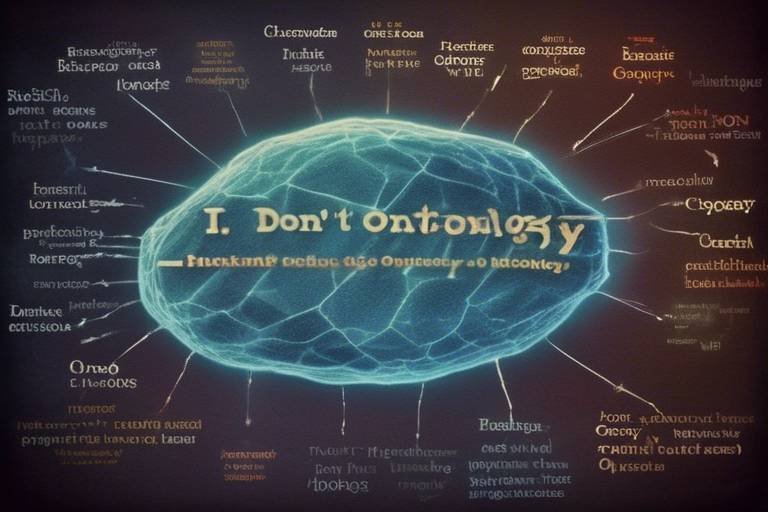Is Ontology the Science of Being?
Ontology, often described as the study of being, dives deep into the very essence of existence itself. But what does that really mean? Imagine standing at the edge of a vast ocean, where each wave represents a different aspect of reality. Some waves are visible, crashing against the shore, while others are hidden beneath the surface, influencing the tides. Ontology is like that ocean; it seeks to explore both the visible and the hidden aspects of what it means to exist. This article will take you on a journey through the intricate waters of ontology, discussing its historical roots, key debates, and its relevance in our modern world.
At its core, ontology asks fundamental questions: What is there? What does it mean to exist? And how do different entities relate to one another? These questions might seem abstract, but they resonate deeply in our everyday lives, influencing everything from scientific research to philosophical inquiry. Think about it—when we categorize things, like animals, plants, or even ideas, we are engaging in ontological thinking. By understanding ontology, we can better navigate the complexities of life and the universe.
The exploration of ontology is not just an academic exercise; it's a necessary endeavor that shapes our understanding of the world. As we unravel the layers of this philosophical discipline, we will uncover its implications in various fields, including science and ethics. So, buckle up as we embark on this exciting exploration of ontology—the science of being!
- What is ontology? Ontology is a branch of philosophy that studies the nature of being, existence, and reality.
- Who is the father of ontology? Aristotle is often considered the father of ontology due to his foundational work in defining substance and essence.
- How does ontology relate to science? Ontology plays a crucial role in organizing knowledge and understanding the nature of entities in various scientific disciplines.
- Can ontology influence ethics? Yes, the study of being can impact our views on personhood, rights, and moral considerations.

Understanding Ontology
Ontology is a fascinating branch of philosophy that dives deep into the essence of being, existence, and reality. Imagine standing at the edge of a vast ocean, each wave representing a different entity or concept. Just as you might wonder about the nature of water or the creatures beneath the surface, ontology encourages us to ponder fundamental questions about what truly exists. What does it mean to say something is? How do we categorize and relate the myriad of entities that populate our understanding of the world? These are not just abstract questions; they form the bedrock of our comprehension of reality.
At its core, ontology seeks to answer questions like: What is the nature of objects? Do abstract concepts like numbers or ideas hold existence in the same way that physical objects do? Ontology isn't just a dusty old philosophical discipline; it's a vibrant area of inquiry that influences various fields, including science, technology, and even our everyday conversations. When we discuss concepts like freedom, love, or justice, we are engaging in ontological considerations. This inquiry is essential for structuring our thoughts and enhancing our communication.
To further illustrate, consider the following key aspects of ontology:
- Entities: What kinds of things exist? Are they physical, abstract, or both?
- Categories: How do we classify these entities? What criteria do we use?
- Relationships: How do different entities relate to one another? What frameworks help us understand these connections?
As we navigate through the complexities of ontology, we begin to see its relevance in our daily lives. It helps us clarify our thoughts and communicate effectively, whether we're discussing the nature of a good life or the existence of a deity. In a world filled with diverse perspectives and beliefs, ontology acts as a guiding light, helping us make sense of the chaos and find common ground.
Ultimately, understanding ontology is not just an academic exercise; it’s a journey into the very fabric of our existence. It challenges us to question our assumptions and explore the depths of what it means to be. As we delve deeper into this philosophical ocean, we discover that the study of being is not only about abstract concepts but also about enriching our understanding of the world around us.

Historical Context
Ontology, as a distinct branch of philosophy, has a rich and intricate history that dates back to ancient times. The roots of this discipline can be traced to the profound inquiries of early philosophers who sought to understand the nature of existence itself. Among these thinkers, Aristotle stands out as a pivotal figure. His explorations into the essence of being laid the foundation for what we now recognize as ontology. But what exactly did Aristotle contribute to this field? Let's take a closer look.
Aristotle introduced a systematic approach to categorizing different forms of existence, which not only shaped the trajectory of philosophical thought but also influenced various disciplines, including science and theology. His seminal work, the Metaphysics, is particularly noteworthy as it delves into the principles of being and reality. Aristotle proposed that everything in the universe can be classified based on its essence and substance, a concept that continues to resonate in modern ontological debates.
Throughout history, ontology has evolved significantly, reflecting the changing landscapes of philosophical inquiry. After Aristotle, thinkers such as Immanuel Kant and Georg Wilhelm Friedrich Hegel further developed ontological concepts, each adding their unique perspectives. Kant, for instance, introduced the idea that our understanding of existence is shaped by our perceptions, thus intertwining ontology with epistemology—the study of knowledge.
In the 20th century, ontology underwent a dramatic transformation with the rise of analytical philosophy. Philosophers like Martin Heidegger and Willard Van Orman Quine challenged traditional ontological assumptions, prompting debates that continue to this day. Heidegger's notion of "being" as a dynamic and ever-evolving concept opened new avenues for understanding existence, while Quine's rejection of a clear distinction between ontology and language forced philosophers to reconsider the very foundations of their inquiries.
To summarize the historical evolution of ontology, consider the following table that outlines key figures and their contributions:
| Philosopher | Key Contribution |
|---|---|
| Aristotle | Introduced the concepts of substance and essence, laying the groundwork for ontology. |
| Immanuel Kant | Explored the relationship between perception and existence, merging ontology with epistemology. |
| Georg Wilhelm Friedrich Hegel | Developed the idea of dialectical reasoning, influencing the understanding of being. |
| Martin Heidegger | Reconceptualized "being" as a dynamic process, rather than a static entity. |
| Willard Van Orman Quine | Challenged the distinction between ontology and language, reshaping ontological discussions. |
This historical context not only highlights the evolution of ontological thought but also illustrates how the study of being has continuously adapted to new philosophical challenges. As we move forward in our exploration of ontology, it is essential to recognize the profound impact these thinkers have had on our understanding of existence and reality.

Aristotle's Influence
Aristotle, often hailed as the father of Western philosophy, has left an indelible mark on the study of ontology. His ideas about substance and essence are not just academic concepts; they form the backbone of how we understand existence itself. Imagine walking into a room filled with various objects. Each object has its own identity, but what makes them what they are? This is where Aristotle's influence comes into play. He proposed that every entity has a substance, which is what it fundamentally is, and an essence, which is its intrinsic nature. This distinction is crucial because it helps us navigate the complexities of existence.
To illustrate this further, consider a chair. Its substance is the material it’s made from—wood, metal, or plastic—while its essence might be defined by its purpose: to provide a place to sit. Aristotle's distinction allows us to categorize and understand objects in a more profound way, setting the stage for future philosophical debates. His work, particularly in the text "Metaphysics," lays out a systematic approach to categorizing beings, which has influenced countless philosophers throughout history.
Aristotle's categories of being, which include substances, qualities, and relations, have shaped the framework for modern ontology. He classified entities into ten categories, ranging from substance to relation, providing a comprehensive system for understanding the various ways in which entities can exist. This classification can be summarized in the following table:
| Category | Description |
|---|---|
| Substance | What something fundamentally is. |
| Quantity | The amount of something. |
| Quality | The characteristics or properties of an entity. |
| Relation | The way in which entities relate to one another. |
| Place | Where an entity is located. |
| Time | When an entity exists or occurs. |
| Position | The arrangement of an entity. |
| State | The condition or situation of an entity. |
| Action | What an entity does. |
| Passion | What happens to an entity. |
These categories do more than just classify; they provoke thought about how we perceive reality. For instance, when we think about a tree, we can recognize it as a substance, but we can also discuss its qualities (green leaves, rough bark) and its relations (providing shade, being a home for birds). This multifaceted approach allows for a richer understanding of existence itself.
Moreover, Aristotle's ideas have not only influenced philosophy but have also permeated other fields such as science and theology. His insistence on empirical observation laid the groundwork for the scientific method, which emphasizes the importance of understanding the essence of things through observation and experimentation. In this way, Aristotle's influence is both profound and far-reaching, making him a pivotal figure in the evolution of ontology.

Substance and Essence
When we dive into the philosophical waters of substance and essence, we find ourselves navigating some of the most profound concepts in ontology. At its core, substance is what something fundamentally is, the underlying reality that gives an entity its identity. Think of it like the skeleton of a body; without it, the body cannot exist in its recognizable form. Essence, on the other hand, is more like the soul—it embodies the intrinsic nature or the defining characteristics that make an entity what it truly is. Together, these concepts form the backbone of ontological inquiry, helping us to distinguish between what things are and what makes them unique.
To illustrate, consider a simple object like a chair. The substance of the chair is its physical material—wood, metal, or plastic. However, the essence of the chair encompasses its purpose: to provide seating. Without the substance, there is no chair; without the essence, the chair loses its significance. This distinction is crucial for understanding how we categorize and relate different entities in our world.
Moreover, the interplay between substance and essence raises intriguing questions. For instance, can the essence of an object change while its substance remains the same? Imagine a chair that is reupholstered. The material (substance) has changed, but its essence as a chair remains intact. This dynamic relationship prompts us to think critically about identity and change in both philosophical and practical contexts. In essence, exploring these concepts allows us to navigate the complexities of existence with greater clarity.
In the realm of ontology, discussions surrounding substance and essence also lead us to consider different philosophical viewpoints. For instance, some thinkers argue that essence precedes existence, meaning that the nature of a thing is predetermined. Others contend that existence comes first, and essence is shaped by experience and interaction with the world. This ongoing debate not only enriches our understanding of being but also influences various fields, from metaphysics to ethics.
In summary, the concepts of substance and essence are foundational to ontological studies. They help us unpack the layers of reality and understand the intricate relationships between different entities. By recognizing the significance of these concepts, we can better appreciate the philosophical inquiries that shape our understanding of existence.

Categories of Being
When we dive into the world of ontology, one of the most fascinating aspects we encounter is the . Aristotle, often regarded as the father of ontology, proposed a systematic way to categorize existence that has influenced philosophers for centuries. He identified various types of beings, which can be broadly classified into several categories that help us understand the complex tapestry of reality.
At its core, Aristotle's categorization revolves around the distinction between substance and accident. Substance is what something fundamentally is, while accidents are the properties or qualities that can change without altering the essence of the substance itself. For instance, consider a tree: its substance is the tree itself, while its height, color, and the number of leaves are accidents that can vary. This distinction is crucial because it lays the groundwork for how we perceive and interact with the world around us.
Aristotle further divided beings into ten categories, known as the Categories of Aristotle, which include:
- Substance - the essence of a thing.
- Quantity - how much there is.
- Quality - the characteristics of a thing.
- Relation - how one thing relates to another.
- Place - where something is located.
- Time - when something occurs.
- Position - the arrangement of a thing.
- State - the condition of a thing.
- Action - what a thing does.
- Passion - what happens to a thing.
Each of these categories serves as a lens through which we can analyze and interpret the world. For example, when discussing a person, we might explore their substance (who they are), their qualities (their personality traits), and their relations (how they connect with others). This multifaceted approach not only enriches our understanding of individual beings but also allows us to engage with broader philosophical questions regarding existence.
Moreover, the are not just a relic of ancient philosophy. They continue to resonate in modern discussions about ontology, especially in fields like metaphysics and epistemology. By categorizing beings, we can better articulate our thoughts and theories about existence, paving the way for deeper insights into the nature of reality.
In contemporary philosophy, there is ongoing debate regarding the adequacy of Aristotle's categories. Some modern philosophers argue for additional categories or entirely new frameworks to account for phenomena that Aristotle's system might overlook. This ongoing discourse highlights the dynamic nature of ontology as a field of study, constantly evolving to address new challenges and insights.
Ultimately, understanding the categories of being is essential for anyone delving into ontological studies. It equips us with the tools to dissect our reality, enabling us to ask profound questions about what it means to exist. Whether you're a seasoned philosopher or just curious about the nature of being, grappling with these categories can lead to enlightening discussions and a greater appreciation for the complexities of existence.
- What is ontology?
Ontology is the branch of philosophy that studies the nature of being, existence, and reality. It seeks to answer fundamental questions about what entities exist and how they can be categorized. - Who is the father of ontology?
Aristotle is often referred to as the father of ontology due to his foundational work in categorizing beings and exploring the nature of existence. - What are the categories of being?
Aristotle proposed ten categories of being, including substance, quantity, quality, relation, place, time, position, state, action, and passion. - How does ontology apply to modern science?
Ontology plays a crucial role in various scientific disciplines, helping to organize knowledge and clarify concepts, especially in fields like computer science and artificial intelligence.

Modern Developments
In recent years, the landscape of ontology has undergone a remarkable transformation, evolving from its classical roots into a vibrant field that intersects with various modern disciplines. This shift is largely driven by advancements in technology, particularly in areas such as artificial intelligence, data science, and information systems. As we grapple with an increasingly complex world, the need for a structured understanding of existence has never been more pressing. Modern thinkers have expanded upon traditional ontological frameworks, introducing innovative concepts that challenge our perceptions of reality and being.
One of the most significant developments in contemporary ontology is the rise of social ontology. This branch examines the nature of social entities and their interrelations. Thinkers like John Searle have contributed to this field by exploring how collective intentions and social constructs shape our understanding of reality. For instance, consider how institutions like money or governments exist not merely as physical entities but as constructs that derive their significance from social agreement. This perspective has profound implications for understanding how we interact with the world around us.
Moreover, the advent of computational ontology has created an exciting intersection between philosophy and technology. With the proliferation of big data, the need to categorize and interpret vast amounts of information has led to the development of ontologies in computer science. These ontologies provide a framework for organizing knowledge, allowing machines to understand and process information more effectively. For example, in artificial intelligence, ontologies help in creating systems that can reason about the world, enabling better decision-making processes.
Another fascinating area of modern ontological debate is the discussion surrounding ontological pluralism. This viewpoint posits that there are multiple ways of understanding being, and that no single framework can capture the entirety of existence. This notion encourages a more inclusive approach to ontology, allowing for diverse perspectives and methodologies to coexist. It challenges the idea of a monolithic ontology and opens up discussions about how different cultures and disciplines interpret existence.
As we delve deeper into these modern developments, it becomes clear that ontology is not just a stagnant field of study; it is a dynamic and evolving discipline that reflects the complexities of contemporary life. The interplay between traditional philosophical questions and modern technological advancements continues to shape our understanding of being, prompting us to reconsider what it means to exist in a world where the boundaries of reality are constantly being redefined.
- What is ontology? Ontology is the philosophical study of being, existence, and reality, examining what entities exist and how they can be categorized.
- How has ontology evolved over time? Ontology has evolved from classical frameworks established by philosophers like Aristotle to modern interpretations that incorporate technology and social constructs.
- What is social ontology? Social ontology investigates the nature of social entities and how collective agreements shape our understanding of reality.
- How is ontology applied in computer science? In computer science, ontologies help organize knowledge, enabling better data management and artificial intelligence systems.
- What is ontological pluralism? Ontological pluralism is the idea that there are multiple valid ways to understand being, promoting diverse perspectives within the field.

Ontology in Science
When we think about the world around us, we often take for granted the underlying structures that define our understanding of reality. Ontology plays a pivotal role in bridging the gap between abstract philosophical concepts and the tangible realms of science and technology. In essence, ontology helps us categorize and interpret the myriad entities that populate our universe, from the smallest particles to the vast expanse of galaxies. This categorization is not just a theoretical exercise; it has practical implications in various scientific fields, enhancing our ability to communicate and collaborate effectively.
One of the most fascinating applications of ontology can be found in computer science. Here, ontologies serve as frameworks that allow us to organize and structure knowledge systematically. Imagine trying to navigate the vast ocean of information available on the internet without a map or a compass. Ontologies act as that map, providing a structured way to represent information and the relationships between different concepts. They are particularly crucial in areas such as:
- Artificial Intelligence: Ontologies enable AI systems to understand and process information in a way that mimics human reasoning. By defining the relationships between various entities, AI can make more informed decisions.
- Data Management: In a world awash with data, ontologies help in organizing this information, making it easier to retrieve and analyze. They facilitate better data interoperability and sharing across different systems.
- Semantic Web Technologies: The semantic web aims to make internet data machine-readable. Ontologies are fundamental in this endeavor, allowing for richer data interlinking and improved search capabilities.
However, the influence of ontology extends beyond the realm of computer science. In the field of scientific realism versus anti-realism, ontology plays a crucial role in shaping our understanding of scientific entities. Scientific realism posits that the entities described by scientific theories exist independently of our perceptions. In contrast, anti-realism suggests that these entities are merely constructs of our understanding. This debate often hinges on ontological questions, such as:
| Aspect | Scientific Realism | Anti-Realism |
|---|---|---|
| Existence of Entities | Entities exist independently | Entities are constructs |
| Truth of Theories | Theories aim to describe reality | Theories are useful fictions |
| Role of Observation | Observation reveals truth | Observation shapes understanding |
This ontological discourse is not merely academic; it has profound implications for how we conduct research and interpret scientific findings. By clarifying the nature of entities we study, ontology assists scientists in framing their hypotheses and understanding the implications of their work. For instance, in biology, ontological classifications can help in understanding the relationships between different species, while in physics, it can aid in conceptualizing fundamental forces and particles.
In summary, ontology serves as a vital thread weaving through the fabric of scientific inquiry. Whether in the organization of knowledge in computer science or the philosophical debates surrounding the nature of existence in scientific realism, ontology provides the tools necessary for a deeper understanding of the world. As we continue to explore the complexities of being, the role of ontology in science will undoubtedly grow, influencing not only how we conduct research but also how we perceive reality itself.

Ontology in Computer Science
In the ever-evolving landscape of computer science, ontology has emerged as a pivotal concept that transcends mere philosophical inquiry, finding practical applications in various technological domains. At its core, ontology in computer science refers to a structured framework that defines the types, properties, and interrelationships of entities within a particular domain. This structured approach is crucial for enabling machines to understand and process information in a way that mimics human reasoning.
One of the most prominent applications of ontology in computer science is in the field of artificial intelligence (AI). Here, ontologies serve as the backbone for knowledge representation, allowing AI systems to interpret and manipulate complex data. For instance, an ontology can provide a detailed description of a domain, such as medical knowledge, defining terms like "disease," "symptom," and "treatment," and illustrating how these concepts relate to one another. This clarity is essential for developing intelligent systems that can make informed decisions based on the data they analyze.
Moreover, ontologies play a significant role in data management. In an age where data is generated at an unprecedented rate, organizing and retrieving relevant information efficiently is more important than ever. By employing ontologies, databases can be structured in a way that enhances searchability and interoperability. For example, an ontology can define relationships between different data types, enabling more sophisticated queries that yield meaningful results. This is particularly valuable in areas like semantic web technologies, where the goal is to create a more connected and intelligent web.
To illustrate the impact of ontology in computer science, consider the following table that summarizes key applications:
| Application Area | Description |
|---|---|
| Artificial Intelligence | Facilitates knowledge representation and reasoning. |
| Data Management | Enhances organization and retrieval of information. |
| Semantic Web | Enables interconnected data and intelligent web services. |
| Natural Language Processing | Improves understanding of language through structured knowledge. |
Furthermore, ontology is instrumental in natural language processing (NLP). By providing a structured framework for understanding the meanings of words and their relationships, ontologies help NLP systems to interpret human language more accurately. For example, when a user asks a question, an NLP system can refer to an ontology to determine the context and provide relevant answers, making interactions more intuitive and effective.
In conclusion, the integration of ontology into computer science not only enhances the functionality of various technologies but also paves the way for advancements in AI, data management, and language processing. As we continue to push the boundaries of what machines can do, the significance of ontology will only grow, providing the necessary structure for a future where computers can truly understand and engage with the world around them.
- What is ontology in computer science?
Ontology in computer science refers to a structured framework that defines the types, properties, and interrelationships of entities within a specific domain, facilitating better data organization and machine understanding. - How does ontology aid artificial intelligence?
Ontology provides a clear representation of knowledge, enabling AI systems to reason about data and make informed decisions based on structured information. - Can ontology improve data management?
Yes, by organizing data in a structured way, ontology enhances the searchability and retrieval of information, making data management more efficient.

Scientific Realism vs. Anti-Realism
When diving into the fascinating world of ontology, one cannot overlook the gripping debate between scientific realism and anti-realism. At its core, this discussion revolves around the nature of scientific theories and the existence of the entities they describe. Scientific realism posits that the world described by science is real and that the entities, such as electrons or black holes, exist independently of our observations. In other words, realists believe that scientific theories provide a true depiction of the world, and our understanding of it becomes more accurate as science progresses.
On the flip side, anti-realism challenges this notion. Anti-realists argue that scientific theories are merely useful instruments for predicting phenomena, and they do not necessarily reflect an objective reality. They contend that our perceptions and interpretations of the world are shaped by our experiences, cultural contexts, and the limitations of our senses. This perspective raises intriguing questions: If our scientific theories are just models, what does that say about the entities they propose? Are they merely figments of our imagination, or do they hold some form of existence?
The implications of these debates stretch far beyond the ivory towers of philosophy; they touch upon how we understand science and its role in our lives. For instance, consider the following points:
- Scientific Realism: Advocates assert that successful scientific theories, especially those that have stood the test of time, point to a reality that exists beyond our perception.
- Anti-Realism: This view emphasizes that our scientific models are not necessarily true but rather effective tools for navigating the complexities of the world.
One of the most compelling aspects of this debate is how it influences our understanding of scientific progress. Realists might argue that as we uncover more about the universe—through physics, chemistry, or biology—we are getting closer to the truth. In contrast, anti-realists might suggest that every new theory merely replaces an old one without necessarily revealing a deeper reality. This ongoing tension leads to a rich dialogue within the scientific community, prompting researchers and philosophers alike to reevaluate the foundations of their work.
In summary, the clash between scientific realism and anti-realism is not just a philosophical exercise; it has profound implications for how we interpret scientific findings and their relevance to our understanding of existence itself. As we continue to explore the nature of being, these debates remind us that our pursuit of knowledge is as much about the questions we ask as it is about the answers we find.
- What is scientific realism? Scientific realism is the view that scientific theories describe the world as it is, including entities that exist independently of our observations.
- What is anti-realism? Anti-realism is the perspective that scientific theories are tools for predicting phenomena rather than true descriptions of an objective reality.
- How do these views affect scientific practice? These views influence how scientists interpret their findings, the nature of scientific progress, and the significance of theoretical entities.

The Importance of Ontology
Ontology is not just an abstract concept; it is a fundamental pillar that supports our understanding of reality. By studying ontology, we delve into the very fabric of existence, exploring questions that have puzzled humanity for centuries. Why is it important, you may ask? Well, ontology provides a structured framework that helps us clarify complex concepts across different disciplines, making it easier to communicate and comprehend ideas that might otherwise seem elusive or convoluted.
In philosophy, ontology helps in dissecting the nature of being and existence. It prompts us to ask essential questions such as: What does it mean to exist? What categories of being are there? These inquiries are crucial as they affect not just academic discussions but also our daily lives. For instance, understanding the concept of personhood in ontology can significantly influence ethical considerations regarding rights and responsibilities.
Moreover, ontology plays a vital role in various fields, including science and technology. In these realms, it helps establish a common language and framework that facilitates collaboration and understanding. By providing clear definitions and classifications, ontology aids in the development of theories and models that can be universally understood. This is particularly evident in fields like artificial intelligence and data management, where ontologies are employed to structure and organize vast amounts of information.
Consider the implications of ontology in everyday reasoning. When we engage in discussions about moral dilemmas or scientific discoveries, our ontological assumptions shape our arguments and conclusions. For example, if we believe that certain entities possess inherent rights, this belief will guide our ethical decisions. Thus, ontology is not merely an academic pursuit; it has real-world consequences that affect how we interact with others and the world around us.
To illustrate the significance of ontology across different domains, let's take a look at the following table that outlines its impact:
| Domain | Importance of Ontology |
|---|---|
| Philosophy | Clarifies concepts of existence and being, influencing ethical theories and discussions. |
| Science | Facilitates the development of theories and models, providing a structured understanding of scientific entities. |
| Technology | Enables effective data management and artificial intelligence applications through organized knowledge representation. |
| Everyday Reasoning | Shapes our ethical considerations and influences our interactions with others. |
Ultimately, ontology serves as a bridge that connects various fields of study, promoting a deeper understanding of the world we inhabit. By examining the nature of being and existence, we can better navigate the complexities of life, fostering a more informed and thoughtful society. So, the next time you ponder the nature of reality or engage in a heated debate about ethics, remember that ontology is at play, guiding our thoughts and actions in ways we might not even realize.
- What is ontology? Ontology is a branch of philosophy that studies the nature of being, existence, and reality.
- Why is ontology important? It helps clarify complex concepts, influences ethical considerations, and enhances our understanding of various disciplines.
- How does ontology apply to science? Ontology provides a framework for structuring knowledge and understanding scientific entities, aiding in theory development.
- Can ontology impact everyday life? Yes, our ontological beliefs shape our interactions, ethical decisions, and understanding of the world.

Clarifying Concepts
Ontology, at its core, serves as a powerful tool for that often seem tangled in the web of philosophical jargon. When we ask ourselves, "What is existence?" or "What does it mean to be?", we are not just dabbling in abstract thoughts; we are laying the groundwork for meaningful discussions across various disciplines, including science, ethics, and even everyday life. By providing a structured framework, ontology helps us dissect these complex ideas, making them more digestible and relatable.
For instance, consider how ontology can illuminate our understanding of different entities. In philosophy, we often grapple with the differences between physical objects, abstract concepts, and even social constructs. Ontology categorizes these entities, allowing us to see their relationships and distinctions clearly. Imagine a tree in your backyard. It's not just a tree; it's a living organism, a part of the ecosystem, a source of oxygen, and even a symbol of growth and stability. Ontology encourages us to explore these multiple dimensions of existence, which can lead to richer conversations and insights.
Moreover, ontology plays a significant role in science and technology. In fields such as computer science, ontologies are used to create structured vocabularies that help machines understand human knowledge. For example, in data management, an ontology might define the relationships between different data types, making it easier for systems to process and retrieve information. This structured approach not only enhances efficiency but also fosters better communication between humans and machines, bridging the gap between abstract concepts and practical applications.
To illustrate the impact of ontology in clarifying concepts, consider the following table that compares traditional definitions of existence with ontological perspectives:
| Traditional Definition | Ontological Perspective |
|---|---|
| Existence is simply being alive. | Existence encompasses various states, such as being, becoming, and essence. |
| Objects are defined by their physical properties. | Objects have essence that transcends physical attributes, influencing their identity. |
| Concepts are abstract and disconnected. | Concepts are relational, interconnected within a broader framework of understanding. |
This table highlights how ontology enriches our comprehension of existence, moving beyond surface-level definitions to explore deeper meanings. As we engage with these ontological frameworks, we find ourselves better equipped to tackle ethical dilemmas, scientific inquiries, and even personal reflections on what it means to exist.
In conclusion, ontology's role in clarifying concepts is invaluable. It not only enhances our understanding of existence but also equips us with the tools to communicate effectively across various domains. Whether we are philosophers, scientists, or everyday thinkers, embracing ontological principles can lead to profound insights and a more nuanced appreciation of the world around us.
- What is ontology? Ontology is a branch of philosophy that studies the nature of being, existence, and reality.
- How does ontology apply to science? Ontology helps organize knowledge and clarify concepts, making it easier to understand scientific principles and entities.
- Why is ontology important for ethics? Ontology influences our understanding of personhood and moral considerations, shaping ethical theories and discussions.

Implications for Ethics
When we delve into the realm of ontology, we uncover more than just abstract concepts; we find a rich tapestry of implications that stretch into the very fabric of ethics. At its core, ontology challenges us to examine what it means to exist and, in turn, what it means to be considered a moral agent. Think about it: if we can define what it means to "be," we can also begin to define who or what deserves moral consideration. This is not merely philosophical jargon; it’s a critical inquiry that influences our laws, our moral frameworks, and our everyday interactions.
One of the most profound implications of ontology for ethics lies in the concept of personhood. The question of who qualifies as a "person" is not just a legal or social question; it is fundamentally ontological. For instance, consider the ongoing debates surrounding artificial intelligence and whether advanced AI systems should have rights. If we define personhood in strictly biological terms, we might exclude these entities from moral consideration. However, if we adopt a broader ontological perspective that includes the capacity for consciousness or self-awareness, the conversation shifts dramatically.
Furthermore, ontology compels us to examine the intrinsic value of beings. Are all beings equal in worth, or do some possess greater moral significance? This inquiry leads us to consider various ethical theories, such as:
- Utilitarianism: This theory evaluates the rightness of actions based on their outcomes, often requiring a clear understanding of the entities affected.
- Deontology: This perspective emphasizes duties and rules, necessitating a clear definition of moral agents.
- Virtue Ethics: Here, the focus is on character traits, which may be influenced by our understanding of what it means to be a good human being.
Moreover, the ontological debate extends to our understanding of rights. If we consider rights as inherent to beings, then we must grapple with the implications of granting or denying those rights based on our ontological classifications. For example, consider how the rights of animals are often debated. Are animals entitled to rights based on their ability to suffer, or do they need to meet certain ontological criteria to be considered worthy of protection?
As we navigate these complex waters, it becomes evident that ontology is not just an academic exercise; it has real-world consequences. Decisions made in the name of ethics often hinge on our underlying ontological beliefs. Whether we are talking about the rights of marginalized human groups, the ethical treatment of animals, or the moral status of artificial intelligences, ontology provides the groundwork for these discussions.
In conclusion, the implications of ontology for ethics are profound and multifaceted. They encourage us to reflect on our definitions of existence, personhood, and moral worth. As we continue to evolve in our understanding of being, we must also evolve our ethical frameworks to accommodate these insights. After all, the way we define existence shapes the way we interact with the world around us.
- What is ontology?
Ontology is a branch of philosophy that studies the nature of being, existence, and reality, focusing on what entities exist and how they can be categorized.
- How does ontology relate to ethics?
Ontology informs ethical discussions by defining concepts such as personhood and moral agency, which influence our understanding of rights and moral consideration.
- Why is the study of being important?
Understanding being is crucial as it shapes our perceptions and interactions within various fields, including philosophy, science, and technology.
- Can artificial intelligence have moral status?
This is a debated topic that hinges on our ontological definitions of personhood and moral agency.
Frequently Asked Questions
- What is ontology?
Ontology is a branch of philosophy that investigates the nature of being, existence, and reality. It delves into fundamental questions about what entities exist and how they can be categorized and related to one another.
- Who were the key figures in the development of ontology?
The origins of ontology can be traced back to ancient philosophers, particularly Aristotle. His ideas on substance and essence have significantly shaped the study of being and influenced many philosophical traditions that followed.
- How does ontology relate to science?
Ontology plays a crucial role in various scientific disciplines by providing a structured understanding of entities and their relationships. It helps clarify concepts and frameworks, which is essential for effective communication and comprehension in scientific discourse.
- What is the significance of substance and essence in ontology?
Substance refers to what something fundamentally is, while essence pertains to its intrinsic nature. These concepts are vital for grasping the complexities of ontological discussions, as they help define the core attributes of entities.
- How does modern ontology differ from historical ontology?
Modern ontology has evolved significantly, incorporating new theories and debates that reflect contemporary philosophical thought. While historical ontology primarily focused on foundational concepts, modern discussions often address practical applications and implications across various fields.
- What role do ontologies play in computer science?
In computer science, ontologies help organize and structure knowledge, facilitating data management, artificial intelligence, and the semantic web. They provide a framework for understanding and representing complex information in a way that machines can process.
- Can ontology influence ethical considerations?
Yes, the study of being has significant ethical implications. It influences our understanding of personhood, rights, and moral considerations, highlighting how ontological questions can intersect with ethical theories and debates.



















